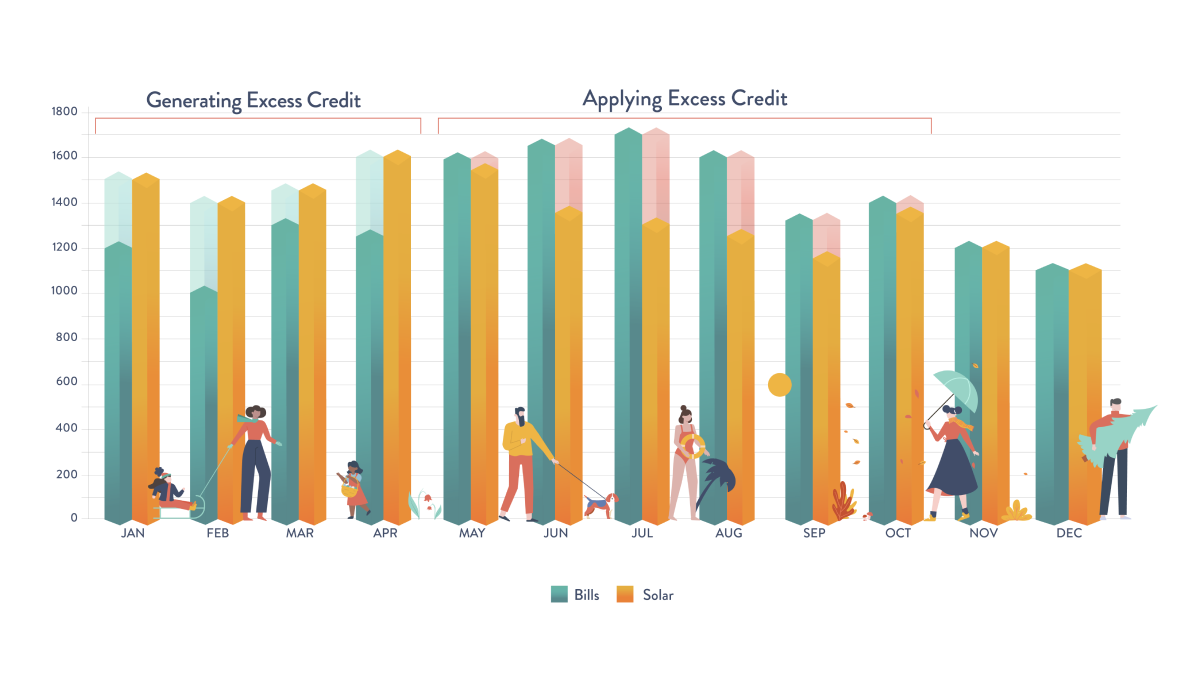Net metering, a policy supporting the adoption of solar energy, is increasingly being challenged by some utilities in Florida, including recent shifts by Gainesville’s GRU 2024, Clay Electric and JEA 2017 (Jacksonville Electric Authority).
These utilities claim that net metering unfairly burdens non-solar customers, a viewpoint that has gained traction amid widespread misinformation. Misunderstandings often arise from complex policy details and utility-driven narratives. At PPM Solar, we’re set to clear up these misconceptions by providing factual information about the true benefits and workings of net metering, helping consumers make informed energy decisions.
When Jacksonville’s utility, JEA, decided to cancel net metering, it significantly impacted the city’s solar landscape. The elimination of net metering disincentivized residents from adopting solar energy, effectively stagnating the growth of the local solar market. This shift not only affected consumer choices but also had broader economic repercussions. The reduction in new solar installations led to job losses in the solar industry, from installation technicians to sales and support roles. Additionally, the lack of new solar projects meant fewer local investments in renewable technologies, slowing down the progress toward sustainable energy goals in the region. This decision has served as a stark reminder of how policy changes can deeply affect the economic and environmental fabric of a community.
Understanding net metering and how it works
Our goal is to explain net metering so readers can clearly understand how it operates within the framework of Florida’s local utilities and highlight the significant advantages it offers to both solar system owners and the broader electrical grid.
What is net metering?
Net metering is a billing mechanism that credits solar energy system owners for the electricity they add to the grid. For homeowners and businesses in Florida, this means that the energy generated by their solar panels can offset the electricity they draw from the utility at other times, effectively reducing their energy bills and optimizing the use of generated solar power.
The benefits of net metering
Net metering offers substantial benefits that extend beyond individual savings. It supports the consumer by reducing utility bills through credits earned from excess energy production. It helps manage demand and reduces strain during peak usage times for utilities, contributing to a more stable and resilient energy supply. Additionally, net metering enhances the appeal of investing in solar by improving the return on investment, making solar installations a more attractive proposition for property owners.
Debunking common myths about net metering
Misinformation about net metering can create barriers to its adoption and acceptance despite its proven benefits to both solar system owners and the utility grid. This section aims to tackle some of the most persistent myths, providing evidence-based explanations to offer a clearer perspective on how net metering genuinely functions and its positive impact on Florida’s energy landscape.
Myth 1: Net metering is unfair to non-solar users
Claim overview
The claim that net metering is unfair to non-solar users often centers on the belief that it results in cost shifting, where non-solar customers pay higher utility costs to cover the incentives provided to solar users. This concern is primarily focused on the financial aspects of how utilities recover the cost of grid maintenance and infrastructure, which are supposedly skewed by net metering policies.
Analysis of the claim
Utility rate structures: utilities typically recover grid maintenance costs through customer utility rates, including fixed and variable charges based on electricity usage. Net metering primarily affects the variable portion since solar users consume less grid electricity due to their own production.
Cost-benefit analysis: studies, such as those conducted by the Lawrence Berkeley National Laboratory, have shown that the benefits solar users contribute to the grid (e.g., reduced need for electricity generation and transmission, environmental benefits) can offset any perceived cost shifts. Moreover, solar installations help reduce peak load demand, which can lower electricity costs for all customers by reducing the need for expensive peak power generation.
Regulatory approaches: in Florida and several other states, public utility commissions regulate net metering rates to ensure fairness. This includes periodic reviews and adjustments to ensure that net metering policies balance the interests of all utility customers.
Refutation of the claim
Economic studies: a comprehensive study by the Brookings Institution found that net metering generally benefits all utility customers by providing downward pressure on rates due to decreased demand for utility-generated electricity and reduced strain on the utility grid system.
Grid enhancement: solar energy contributed during daytime peak usage times means utilities need to invest less in additional power plants and transmission infrastructure, which can lead to savings that benefit all customers, not just those with solar panels.
Fair prices: solar system owners still pay a monthly electric fee that ranges from $15 to $50 a month—$300 per year on average—for being connected to the grid.
Equitable access programs: efforts to expand solar accessibility, such as community solar projects and incentives for low-income households, are increasing. These programs help distribute solar benefits more broadly, reducing the disparity between solar and non-solar users.
Local Florida context
In Florida, the debate continues, but efforts like the Solar Together program by Florida Power & Light (FPL) show attempts to balance the system by allowing wider participation in solar benefits. Moreover, the state’s regulatory body keeps an eye on rate structures to maintain fairness.

Myth 2: Net Metering will lead to higher energy prices
Claim overview
Critics often assert that net metering will inflate energy prices for all consumers. This concern is predicated on the idea that as more individuals install solar panels and use net metering, utilities will have fewer customers to spread their fixed costs, leading to higher rates for those without solar.
Analysis of the claim
Peak load reduction: solar energy systems typically generate power during peak usage times of the day. By contributing electricity to the grid when it is most needed, solar systems can reduce the necessity for utilities to invest in expensive peak power plants, which are often activated during high-demand periods and are more costly to operate.
Deferred infrastructure investments: increased adoption of solar power can lead to deferred or eliminated need for new infrastructure investments such as power plants and transmission lines. Solar panels help distribute generation across the grid, which can minimize the load and strain on existing infrastructure and delay costly upgrades.
Wholesale price reduction: by generating power at the point of consumption, net metering reduces the amount of energy lost in transmission and distribution, leading to more efficient use of the power grid. This efficiency can help lower wholesale electricity prices by reducing utility fuel costs and associated environmental compliance costs.
Rebuttal of the claim
Reducing the need for new power plants: net metering presents a significant advantage in energy management by reducing the need for additional power plant construction. When homeowners and businesses generate their own solar power and feed excess energy back into the grid, it lessens the overall demand from traditional power sources. This distributed generation helps to balance energy loads and peak demands more efficiently. As a result, utilities can defer or even avoid the costly process of building new power plants, which also contributes to reducing carbon emissions and promoting sustainable energy use.
Economic impact studies: studies from various energy markets show that the introduction of distributed solar generation tends to lower prices in the wholesale market by reducing the demand from traditional power sources during peak times, which are the most expensive periods for power production.
Grid stabilization benefits: by providing additional power supply during peak hours, solar energy helps stabilize the grid and avoid the use of expensive emergency resources, which utilities often pass on as higher costs to consumers.
Long-term pricing trends: in regions with high penetration of solar power, long-term pricing trends have shown stability or decrease in energy costs. The presence of solar energy tends to cap and reduce the market power of more expensive fossil fuel generators.
Local Florida context
In Florida, initiatives like net metering are supported by studies indicating that solar power can lead to overall cost savings. For example, a report from the Florida Public Service Commission has noted that solar installations contribute positively to the state’s energy portfolio, potentially lowering costs for all by reducing reliance on more expensive energy generation methods.
Myth 3: Net metering burdens the power grid
Claim overview
The myth that net metering burdens the power grid is rooted in concerns that intermittent solar power can create instability and require additional grid management resources. Critics argue that as more solar systems feed electricity back into the grid, it could lead to operational challenges, including voltage regulation and frequency control.
Analysis of the claim
Intermittency management: advances in grid technology have greatly improved the ability of utilities to manage the intermittency of renewable energy sources like solar power. Smart grid technologies, demand response programs, and battery storage solutions are increasingly used to balance supply and demand effectively.
Contribution to grid resilience: solar power systems can enhance grid resilience by reducing the load on centralized power plants and decreasing transmission losses. Distributed generation, which includes residential and commercial solar systems, helps to decentralize the energy supply, making the grid less susceptible to failures and outages.
Peak demand reduction: solar power generation aligns closely with peak energy demand periods, especially in sunny regions like Florida. By producing electricity during peak hours, solar systems reduce the strain on the grid and diminish the need for utilities to activate costly peaking power plants.
Rebuttal of the claim
The challenge of integrating solar power into the utility grid, particularly concerning baseload and intermittent regulation, is significant when solar penetration levels approach 30% or more.
National Renewable Energy Laboratory (NREL) suggests that the Western Interconnection, a large power system network in the Western United States, has sufficient flexibility and ramping capability to manage high levels of solar photovoltaic (PV) penetration, potentially up to 33% (American Public Power Association). Currently, rooftop solar generation accounts for less than 1% of overall power in Florida
Grid modernization benefits: modernizing the grid with advanced monitoring and energy management systems has allowed utilities to integrate higher levels of solar energy more smoothly. These systems provide real-time data and control needed to maintain grid stability.
Economic and environmental benefits: by offsetting peak power, solar contributions help avoid the high costs and environmental impacts associated with running additional fossil fuel plants. This not only stabilizes the grid but also leads to economic savings and reduced emissions.
Regulatory support and technological innovations: various regulatory frameworks support the integration of renewable energy, encouraging utilities to adopt technologies that enhance grid flexibility and storage capabilities. Innovations like smart inverters and grid-interactive efficient buildings are proving effective in making solar contributions beneficial rather than burdensome to the grid.
Local Florida context
Florida’s utilities are increasingly investing in grid modernization initiatives that facilitate the integration of solar power. Programs and pilot projects focusing on energy storage, advanced metering infrastructure, and renewable integration are demonstrating that a well-managed grid can handle increased solar penetration without compromising stability.
Current status of net metering laws in Florida
The landscape of net metering in Florida is experiencing significant shifts, reflecting broader trends that could affect the future of solar energy in the state. Recent changes by several major utilities have sparked concerns among current and prospective solar users.
Analyzing recent policy changes
Utilities such as Gainesville Regional Utilities (GRU), Clay Electric, and Jacksonville Electric Authority (JEA) have revised their net metering policies. This trend indicates a growing concern among utilities about the sustainability of full net metering benefits in the face of increasing solar adoption. By grandfathering existing customers, these utilities aim to balance the benefits to long-standing solar users with the financial implications of widespread solar uptake on their revenue and grid maintenance costs.
The importance of acting now
For Florida residents connected to utilities that currently offer net metering, the message is clear: now is the time to act. Secure a solar system installation under the existing favorable net metering terms. This is especially pertinent as the actions taken by GRU, Clay Electric, and JEA may set a precedent for other utilities in Florida, potentially leading to more widespread revisions of net metering policies.
Strategic considerations for prospective solar users
Check utility policies: if you are considering installing solar panels, verify your local utility’s current net metering policies. This will help you understand whether you can still benefit from full net metering.
Move quickly: given the trend of policy changes, installing solar systems under favorable terms can safeguard your investment against future reductions in benefits.
Stay informed: keeping abreast of local energy policy developments can help you anticipate changes that might affect your decision to go solar or your financial returns from an existing system.
Advocacy: engage in advocacy efforts to support continuing or enhancing net metering policies. Active participation in discussions and lobbying can influence energy policies at both local and state levels.

Limitations of net metering in Florida
Recent changes in net metering in Florida
Net metering, the mechanism that credits solar energy system owners for the electricity they add to the grid, has seen significant changes recently. Notably, Gainesville Regional Utilities (GRU) canceled net metering on April 17, 2024. This pivotal change could affect the financial calculations for solar investments in the Gainesville area.
Compensation for solar energy contribution
While net metering traditionally allows you to reduce your electricity costs by feeding surplus solar power back to the grid, it’s important to know that not all utilities compensate at the full retail rate you pay for electricity. For example, if your usual rate is 16 cents per kWh, the compensation rate might be around 3 cents per kWh, varying by utility (in other words, you only get paid 18% of retail value). Typically, a solar homeowner will still have at least an $80/month electric bill on average in Florida, simply due to site limitations and roof sizing. Most solar homeowners offset around 80% of their total electric bills.
Limits on credit accumulation
In line with most Florida utilities, net metering policies generally cap the amount of credit you can accumulate to no more than your annual energy consumption. Should your system produce more energy than you use in a month, most programs roll over the surplus to the next billing period. Importantly, any excess generation credits typically do not result in cash payments at the end of the 12-month period. Solar homeowners do not sell retail electricity to the grid; they only offset their own energy use with credits. So, there is no “excess net metering” on an annual basis.
Designing your solar system
To maximize your investment, collaborate with a trusted solar installer to design a system that meets your specific energy needs without excessive overproduction. This approach ensures that you generate enough electricity to maximize your utility bill savings without losing potential credits at the end of the year.
Check your utility’s net metering policy
With GRU’s recent cancellation of net metering and potential variability in policies across different regions, it is important to verify the current net metering eligibility and conditions with your local utility or a knowledgeable contractor before proceeding with solar installation.
The net metering landscape in Florida is complex and can significantly impact the economics of going solar. Before making a decision, ensure you are fully informed about the net metering policies of your specific utility. Consulting with a local solar expert can provide you with up-to-date information and help you navigate these regulations effectively.
How to maximize your benefits from net metering
Maximizing the benefits of net metering involves strategic planning and informed decision-making. Here are key tips for Florida residents:
- Optimize system size: work with a qualified solar installer to determine the optimal size for your solar system based on your historical electricity usage. This ensures that your system is not undersized, missing potential savings, or oversized, wasting financial resources and generating unusable surplus energy.
- Monitor system performance: regularly check your solar system’s performance to ensure it operates efficiently. Monitoring can identify any drops in output due to technical issues or maintenance needs, allowing you to rectify problems before they affect your net metering credits.
- Understand your utility’s billing cycle and rates: familiarize yourself with your utility’s billing practices, particularly how net metering credits are calculated and applied. This knowledge can help you plan your energy usage and solar production to coincide with peak rate periods, maximizing the financial returns of net metering.
- Invest in energy storage: consider investing in a battery storage system to store excess solar energy produced during peak times. This stored energy can be used during non-sunlight hours or during higher rate periods if your utility uses time-of-use rates, enhancing the benefits of net metering.
- Live with the sun: optimizing your energy use cycle to improve self-consumption. By using the majority of the heavy electric loads during sun hours, homeowners can benefit from improved self-consumption (solar energy is used at the point of production, not traded with the utility). Examples of shifting loads to sun hours include setting the timer on the electric water heater to operate the sunny part of the day, setting the EV charger to maximize sun-hour charging (a standard feature of TESLA home infrastructure), and simply running appliances at the appropriate time. Some of the appliances that are easy to time include dishwashers, clothes washers and dryers, meal prep, and even getting the AC slightly lower before the sun comes down to create a thermal storage effect. Specifically, what we see doable is a shift from 45% to as much as 65% self-consumption without any changes in lifestyle, dramatically improving the ROI on the grid-tied systems and reducing the use of batteries.
In this article, we explored net metering, which offers significant advantages by allowing solar system owners to offset their energy costs and contribute to a more sustainable energy grid. However, the evolving regulatory landscape and the variability of policies across different utilities highlight the importance of staying informed and proactive.
As Florida moves forward, citizens, solar advocates, and critically important that political leadership is informed on clean energy matters to make good decisions for their constituents moving forward. Participating in discussions, advocating for fair policies, and making educated decisions about solar energy will help ensure that net metering continues to provide value to both individual consumers and the broader community. By getting educated and spreading the word about what solar and net metering really are and the positive impact that can be created and contributed to the larger goal of energy independence and sustainability in Florida and nationwide.



